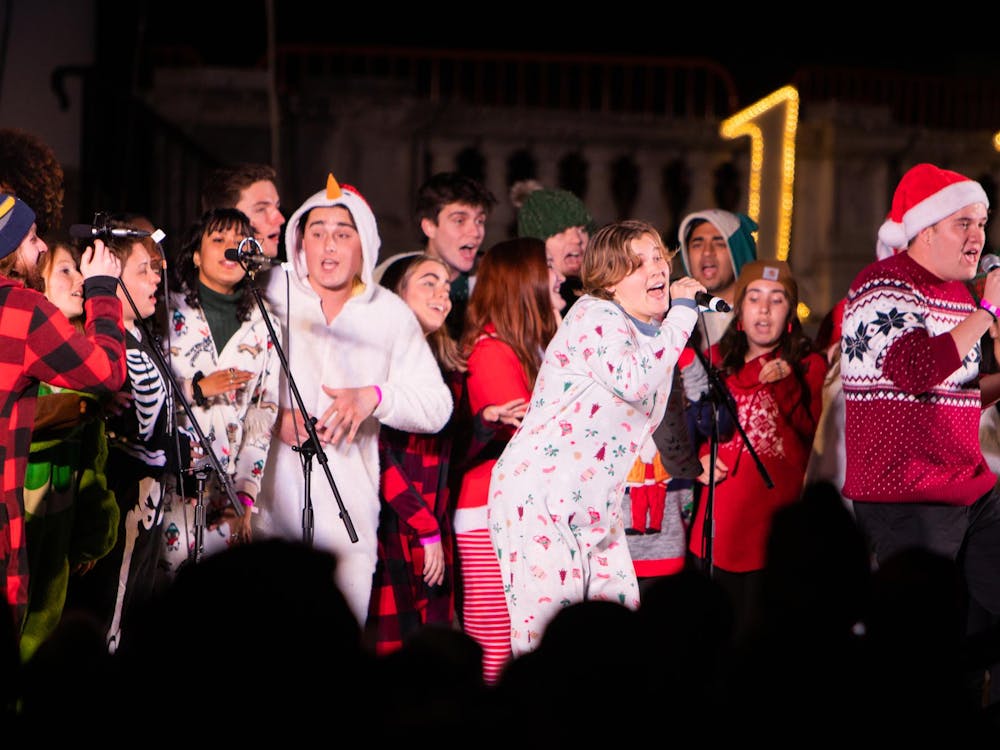It's hard not to notice the presence of
University Guides around Grounds. After all, they lead large groups of perspective students and exhausted parents through the University every day. But the U-Guides are also making an impact in the classroom.
Several U-Guides help their peers better understand the University by teaching LASE 152, History of Mr. Jefferson's University.
The one-hour, pass-fail class covers various topics about Jefferson's political and personal life, how historical trends in America have affected the University and what the future may hold for it.
The class was developed several years ago in response to the 250th anniversary of Jefferson's birth. Right from the beginning, in compliance with the Jeffersonian principle of self-governance, the class began as a student endeavor.
"We wanted to do something that would last in honor of the anniversary," said Phyllis Leffler, a history professor who serves as the course's faculty advisor. "The class was a student idea right from the start. The University Guide Service had the idea and went out and found a faculty sponsor."
The class may have a faculty advisor, but professors and teaching assistants need not apply. Undergraduates affiliated with the University Guide Service primarily run the class.
Two student co-directors are responsible for booking the weekly guest speakers. Five other undergraduates, one for each section of the class, serve as facilitators for the class and are responsible for taking attendance, grading papers and stimulating discussion. All positions are unpaid.
"I don't really feel like a teacher. Maybe when there is dead silence and I have to start asking questions, then I'll feel a little like one," said Anne Magnan, third-year College student and facilitator.
"All the facilitators make it clear that we just happen to know a little more about some of the topics, since we have been guides," said Kasey Gordon, class facilitator and fourth-year College student. "But we also make it clear that we don't have all the answers and that we are learning too."
In addition to learning about the University, facilitators get to learn how to prepare for and teach a course.
Each week before class, the two co-directors and the facilitators meet to discuss the lesson plans for that week's class. During this meeting, the facilitators and co-directors often brainstorm questions in case students run out of questions for that week's speaker. Facilitators also create questions to stimulate discussion between students.
"It's easy to pick out the quiet students. You try to ask them the easy questions that involve an opinion that they are willing to share," said Mary Ashburn, co-director and third-year College student. "We never want to put anyone on the spot, but hopefully some questions will make the quiet ones more confident."
Magnan said some students actually feel more comfortable participating in class discussions when one of their peers is leading the discussion.
"Having a student facilitator alleviates the pressure for some students," she said. "When you have a professor, sometimes it's more intimidating. There's no way you can know as much as a professor who has been studying his field for 40 years."
"In the Jeff class, we're all equals," she added. "We're all learning."
Although facilitators teach students their own age, they have had few problems with authority over their class.
Ashburn said when she facilitated last year she worried that students would not respect her, since she was neither a teaching assistant nor a professor.
"I was a lot more nervous than I should have been," she said. "I expected some respect issues, concerning students walking over me. But I was pleasantly surprised. I have had a positive reaction from everyone involved."
There are a few cases every semester, however, in which a student turns in an inadequate paper and expects to receive credit. This semester's Jefferson class requires five two-page papers, which students can turn in at any time during the semester.
"The last thing we want to do is fail someone, but there is a such thing as an unacceptable paper," Gordon said.
Although facilitators receive no formal training for the class, co-directors are responsible for telling facilitators how to grade papers. Co-directors Ashburn and third-year College student J.Y. Brown made pamphlets for facilitators that serve as a training guide.
"We are looking to see that students have had some engagement with the material," Ashburn said. "We don't want any personal essays like 'The Rotunda is hot, and I'm not comfortable there.'"
If a student disagrees with a facilitator concerning a grade, the student can consult Leffler, who serves as the faculty advisor for the facilitators and co-directors.
"So far, lack of respect for facilitators hasn't been an issue," Leffler said. "If a student didn't come to class, they didn't come. Usually, if students haven't been there, they know it. It's less of a matter of respect and more a matter of responsibility."
Teaching assistants and professors have never been discussion leaders or graders for the class, and they probably never will be, Leffler said.
"A lot of the TAs that are here did not go here as undergraduates, so they wouldn't be as knowledgeable as the student facilitators from the guide service," Ashburn said.
Ultimately, facilitators do the job to learn more about the University, which enables them to give better tours. Facilitators also take the job out of love for the University.
"I think that the University would rather have students facilitating the class than have TAs in charge because facilitating is a good way to get students involved and to give them leadership experience," Magnan said. "We are also willing to do it for free because we are enjoying ourselves. We enjoy sharing our knowledge of the University with other students."




